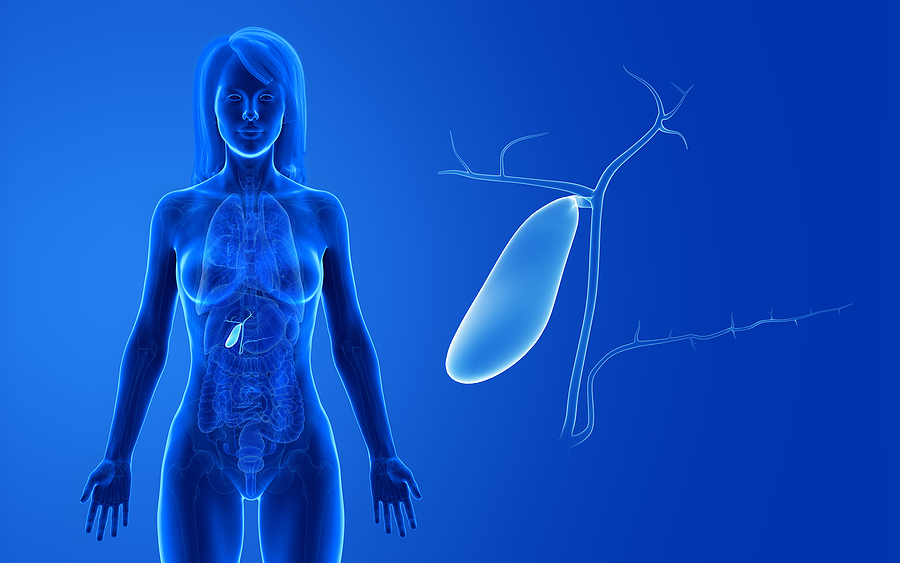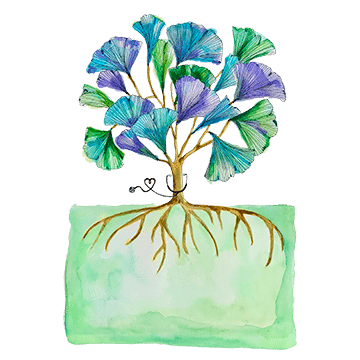
What Your Gallbladder Does & How to Keep it Healthy
On the right side of your abdomen, just under the ribcage, is the gallbladder. A small pear-shaped organ, it supports the body’s detoxification process and, working with other organs, is crucial to the digestion of certain foods, particularly fatty foods.
The gallbladder connects to the liver and small intestine via ducts that transport bile (a yellowish-green liquid secreted by the liver). Together, the gallbladder and these ducts are known as the biliary system. Bile contains water, cholesterol, lipids (fats), salts, and bilirubin (the pigment that gives bile and stools their color). A healthy gallbladder stores and concentrates bile, secreting it into the small intestine through the bile duct during the digestive process. Once in the small intestine, bile helps digest fat.
Causes of Gallbladder Dysfunction
An unhealthy gallbladder can result in problems with both
digestion and detoxification and can be attributed to a number of causes including:
- Unhealthy diet and lifestyle habits
- Excessive stress
- Gastrointestinal illness
- Obesity
- Nerve degeneration
- Inflammation
- Hypothyroidism and hormone dysregulation
- Anatomical abnormalities
Gallbladder Conditions:
Hyperkinetic Biliary Dyskinesia: The gallbladder contracts too frequently. This causes extreme pain that feels like it is emerging from the heart. Symptoms include increased heart rate, decreased muscle strength, and elevated pressure in the gallbladder.
Hypokinetic Biliary Dyskinesia: The gallbladder does not contract frequently enough (more common condition than above). Symptoms include pain in the upper right abdomen after eating a high-fat meal, as well as indigestion, nausea, vomiting, bloating and fatigue. Pain and cramping does not subside when gas is passed or by a bowel movement.
Cholelithiasis: Caused by gallstones becoming lodged in ducts and blocking the flow of bile. Gallstones develop when substances in the bile, primarily cholesterol and bile pigments, form hard, crystal-like particles. These “stones” can be incredibly small or as large as the gallbladder itself.
The most common symptom of gallstones is intermittent abdominal pain and spasm in the right upper abdomen (may also be felt in the back and right shoulder). Other symptoms include nausea, vomiting, and intolerance to fatty foods. Recurrent duct blockages can lead to a total obstruction that results in significant fever and requires immediate medical attention. Other complications include jaundice, a yellow discoloration of the skin and eyes; infection of the bile ducts; and inflammation of the pancreas. If the bile duct remains blocked for a long period of time, irreversible liver damage may occur.
If the gallbladder is removed, the body does not have a way to efficiently digest fats. Ox bile (or another bile salt) is a common supplement used to support the digestion of fats in people who do not have a gallbladder.
Maintain a Healthy Gallbladder:
Commit to a diet high in fiber, low in hydrogenated fats, along with fresh whole fruits and vegetables. If you are at risk for gallbladder disease, consider these dietary adjustments:
- Choose oats, brown rice, quinoa, or barley for healthy fiber sources
- Drink plenty of water throughout the day
- Exercise regularly; walk leisurely after meals to facilitate digestion
- Sit-up while eating; consider adjusting timing and frequency of meals
- Chew foods well and take your time eating
- Choose lean cuts of meat and poultry. Prepare meat in a way that allows fat/grease to drip away. Remove the skin from poultry
- Include more fish in your weekly menu
- Avoid processed food and foods containing trans-fatty acids and highly processed oils
- Include healthy oils such as olive oil, coconut oil, and avocado oil
- Trade dairy products for non-dairy milk, cheese and yogurt
- Take digestive support supplements, such as enzymes or ox bile
Dietary changes are unique to everyone so it is important to discuss your needs with a holistic health practitioner who specializes in clinical nutrition and can customize a diet and nutritional supplement plan for you.
Resources:
HealthLinkBC.ca “Eating Guidelines for Gallbladder Disease.” Accessed 26 May 2020:
GallbladderAttack.com “What You Need To Know About Biliary Dyskinesia.” Accessed 26 May 2020
ClevelandClinic.org “Diet for Gastroparesis.” Accessed 26 May 2020
Pizzorno, Joseph E. (2013). Textbook of Natural Medicine (4th ed). St. Louis, MO Elsevier

